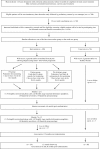Study protocol for "Moving Bright, Eating Smart"- A phase 2 clinical trial on the acceptability and feasibility of a diet and physical activity intervention to prevent recurrence in colorectal cancer survivors
- PMID: 23688320
- PMCID: PMC3716902
- DOI: 10.1186/1471-2458-13-487
Study protocol for "Moving Bright, Eating Smart"- A phase 2 clinical trial on the acceptability and feasibility of a diet and physical activity intervention to prevent recurrence in colorectal cancer survivors
Abstract
Background: Colorectal cancer is the second most common cancer and cancer-killer in Hong Kong with an alarming increasing incidence in recent years. The latest World Cancer Research Fund report concluded that foods low in fibre, and high in red and processed meat cause colorectal cancer whereas physical activity protects against colon cancer. Yet, the influence of these lifestyle factors on cancer outcome is largely unknown even though cancer survivors are eager for lifestyle modifications. Observational studies suggested that low intake of a Western-pattern diet and high physical activity level reduced colorectal cancer mortality. The Theory of Planned Behaviour and the Health Action Process Approach have guided the design of intervention models targeting a wide range of health-related behaviours.
Methods/design: We aim to demonstrate the feasibility of two behavioural interventions intended to improve colorectal cancer outcome and which are designed to increase physical activity level and reduce consumption of a Western-pattern diet. This three year study will be a multicentre, randomised controlled trial in a 2x2 factorial design comparing the "Moving Bright, Eating Smart" (physical activity and diet) programme against usual care. Subjects will be recruited over a 12-month period, undertake intervention for 12 months and followed up for a further 12 months. Baseline, interim and three post-intervention assessments will be conducted.Two hundred and twenty-two colorectal cancer patients who completed curative treatment without evidence of recurrence will be recruited into the study. Primary outcome measure will be whether physical activity and dietary targets are met at the end of the 12-month intervention. Secondary outcome measures include the magnitude and mechanism of behavioural change, the degree and determinants of compliance, and the additional health benefits and side effects of the intervention.
Discussion: The results of this study will establish the feasibility of targeting the two behaviours (diet and physical activity) and demonstrate the magnitude of behaviour change. The information will facilitate the design of a further larger phase III randomised controlled trial with colorectal cancer outcome as the study endpoint to determine whether this intervention model would reduce colorectal cancer recurrence and mortality.
Trial registration: ClinicalTrials.gov No: NCT01708824.
Similar articles
-
The Norwegian dietary guidelines and colorectal cancer survival (CRC-NORDIET) study: a food-based multicentre randomized controlled trial.BMC Cancer. 2017 Jan 30;17(1):83. doi: 10.1186/s12885-017-3072-4. BMC Cancer. 2017. PMID: 28137255 Free PMC article.
-
Self-monitoring and reminder text messages to increase physical activity in colorectal cancer survivors (Smart Pace): a pilot randomized controlled trial.BMC Cancer. 2019 Mar 11;19(1):218. doi: 10.1186/s12885-019-5427-5. BMC Cancer. 2019. PMID: 30866859 Free PMC article. Clinical Trial.
-
CanPrevent: a telephone-delivered intervention to reduce multiple behavioural risk factors for colorectal cancer.BMC Cancer. 2012 Nov 27;12:560. doi: 10.1186/1471-2407-12-560. BMC Cancer. 2012. PMID: 23181756 Free PMC article. Clinical Trial.
-
Role of physical activity and diet after colorectal cancer diagnosis.J Clin Oncol. 2015 Jun 1;33(16):1825-34. doi: 10.1200/JCO.2014.59.7799. Epub 2015 Apr 27. J Clin Oncol. 2015. PMID: 25918293 Free PMC article. Review.
-
A Web-based Lifestyle Intervention for Cancer Survivors: Feasibility and Acceptability of SurvivorSHINE.J Cancer Educ. 2022 Dec;37(6):1773-1781. doi: 10.1007/s13187-021-02026-x. Epub 2021 Jun 1. J Cancer Educ. 2022. PMID: 34061334 Free PMC article. Review.
Cited by
-
Dietary interventions for adult cancer survivors.Cochrane Database Syst Rev. 2019 Nov 22;2019(11):CD011287. doi: 10.1002/14651858.CD011287.pub2. Cochrane Database Syst Rev. 2019. PMID: 31755089 Free PMC article.
-
Effects of dietary and physical activity interventions on generic and cancer-specific health-related quality of life, anxiety, and depression in colorectal cancer survivors: a randomized controlled trial.J Cancer Surviv. 2020 Aug;14(4):424-433. doi: 10.1007/s11764-020-00864-0. Epub 2020 Feb 18. J Cancer Surviv. 2020. PMID: 32072434 Free PMC article. Clinical Trial.
-
Physical activity interventions for disease-related physical and mental health during and following treatment in people with non-advanced colorectal cancer.Cochrane Database Syst Rev. 2020 May 3;5(5):CD012864. doi: 10.1002/14651858.CD012864.pub2. Cochrane Database Syst Rev. 2020. PMID: 32361988 Free PMC article.
-
Lived experience of dietary change among Chinese colorectal cancer survivors in Hong Kong: A qualitative study.BMJ Open. 2021 Aug 25;11(8):e051052. doi: 10.1136/bmjopen-2021-051052. BMJ Open. 2021. PMID: 34433608 Free PMC article.
-
Immune System, Microbiota, and Microbial Metabolites: The Unresolved Triad in Colorectal Cancer Microenvironment.Front Immunol. 2021 Mar 26;12:612826. doi: 10.3389/fimmu.2021.612826. eCollection 2021. Front Immunol. 2021. PMID: 33841394 Free PMC article. Review.
References
-
- Colorectal cancer in Hong Kong. http://www3.ha.org.hk/cancereg/colorectum_2010.pdf.
-
- Cancer incidence in five continents. Volumes I to IX. http://ci5.iarc.fr/CI5i-ix/ci5i-ix.htm.
-
- Colorectal Cancer Report 2010 Summary. Food, nutrition, physical activity, and the prevention of colorectal cancer. World Cancer Research Fund/American Institute of Cancer Research, Continuous Update Project; 2010.
-
- WCRF/AICR. Food, nutrition, physical activity and the prevention of cancer. A global perspective. Washington DC: WCRF/AICR; 2007.
Publication types
MeSH terms
Associated data
LinkOut - more resources
Full Text Sources
Other Literature Sources
Medical
Miscellaneous


